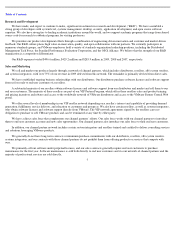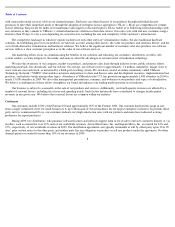VMware 2009 Annual Report Download - page 20
Download and view the complete annual report
Please find page 20 of the 2009 VMware annual report below. You can navigate through the pages in the report by either clicking on the pages listed below, or by using the keyword search tool below to find specific information within the annual report.
Table of Contents
more of these distributors could delay payments or default on credit extended to them. Our exposure to credit risks of our distributors may
increase if our distributors and their customers are adversely affected by the recent global economic downturn, or if there is a continuation or
worsening of the downturn. Additionally, we provide credit to distributors, resellers, and certain end user customers in the normal course of
business. Credit is generally extended to new customers based upon a credit evaluation. Credit is extended to existing customers based on
ongoing credit evaluations, prior payment history, and demonstrated financial stability. Any significant delay or default in the collection of
significant accounts receivable could result in an increased need for us to obtain working capital from other sources, possibly on worse terms
than we could have negotiated if we had established such working capital resources prior to such delays or defaults. Any significant default
could result in a negative impact on our results of operations.
The large majority of our revenues have come from our data center virtualization products including our flagship VMware vSphere product
line. Decreases in demand for our data center virtualization products could adversely affect our results of operations and financial condition.
In fiscal year 2009, over 90% of our license revenues were from our data center solutions with the balance from our other solutions.
Although we are continuing to develop applications for our virtualization technology such as our desktop virtualization products and our data
center management and automation products, we expect our data center virtualization products and related enhancements and upgrades will
constitute a majority of our revenue for the foreseeable future. Declines and variability in demand for our data center virtualization products
could occur as a result of:
Due to our product concentration, our business, results of operations, financial condition, and cash flows would therefore be adversely
affected by a decline in demand for our data center virtualization products.
Our revenues, collection of accounts receivable and financial results may be adversely impacted by fluctuation of foreign currency exchange
rates. While foreign currency hedges can offset some of the risk related to foreign currency fluctuations, we will continue to experience
foreign currency gains and losses in certain instances where it is not possible or cost effective to hedge our foreign currency exposures.
Our revenues and our collection of accounts receivable may be adversely impacted as a result of fluctuations in the exchange rates between
the U.S. Dollar and foreign currencies. For example, we have distributors in foreign countries that may incur higher costs due to the
strengthening of the U.S. Dollar. One or more of these distributors could delay payments or default on credit extended to them as a result. Any
significant delay or default in the collection of significant accounts receivable could result in an increased need for us to obtain working capital
from other sources. If we determine that the amount of accounts receivable to be uncollectible is greater than our estimates, we would recognize
an increase in bad debt expense, which would have a negative impact on our results of operations. In addition, in periods when the value of the
U.S. Dollar strengthens, we may need to offer additional discounts, reduce prices or offer other incentives to mitigate the negative effect on
demand.
In May 2009, we started to invoice and collect in non-U.S. Dollar denominated currencies, thereby conducting a portion of our revenue
transactions in currencies other than the U.S. Dollar. Although this program may alleviate credit risk from our distributors during periods when
the U.S. Dollar strengthens, it may also
17
•
improved products or product versions being offered by competitors in our markets;
•
competitive pricing pressures;
•
failure to release new or enhanced versions of our data center virtualization products on a timely basis, or at all;
•
technological change that we are unable to address with our data center virtualization products; or
•
general economic conditions.
























